Racing to the old Portugese colony of Macau

We raced on a 38 foot sailboat to Macau, a former
Portugese colony about 60 miles from downtown Hong
Kong. Macau, like Hong Kong, was a colony that has
recently been handed over to the Chinese government.
Neither Macau nor Hong Kong have been fully integrated
into China yet, so when we pass between Hong Kong and
Macau or between Macau and China, or Hong Kong and
China, we must clear customs and immigration as though
we are exiting and entering a foreign country. For
us, a race to Macau offered us an excellent
opportunity to renew our 90 day Hong Kong visas in an
incredibly inexpensive and pleasant fashion and
offered us a pleasant weekend getaway.
While we are moored very close to downtown by public
transport, sailing around the penninsula and islands
to the starting line added an additional 15 miles to
the trip. Though several crew members took some
preventative medicine, they took it too close to our
6am departure to take effect before we faced rough
seas between Hebe Haven and the starting line that
were churned up due to some strong southerly winds
resulting from a typhoon south of us. Half the crew
was feeling the effects of seasickness before we even
reached the starting line; Somehow, despite
seasickness, we got 2nd place in a big fleet, mostly
due to an excellent start.

As we entered the protected waters in the Pearl river
delta near Macau, we saw pink dolphins! Seeing
something the color of a pig in the milky greenish
brown river water really caught me by surprise, even
though we'd been looking for them, since they are so
different from sealife I am used to seeing. We have
heard that since the disruptive building of the new
airport in Hong Kong, that pink dolphins have become a
more rare site in their favored swimming grounds.
Besides pink dolphins, the Pearl river delta is also
famous for its pearl harvesting. In the old days many
lives were lost in the attempt to bring pearl oysters
up from the bottom while holding their breath.
Towards the middle of the afternoon, we crossed the
finish line and made our way into the port in the gap
between the islands of Macau, and Taipa. We were all
excited for our arrival in this charming place and
looking forward to some fine Portguese food and Vinho
Verde during the 2 nights we'd stay before racing home
again. We partied when we arrived alongside the
rickety old docks that hadn't seen this many fancy
sailboats since last year's race. We enjoyed the
comraderie of our fellow sailors along with beers and
a great potluck as one of our crew handled customs and
immigration on our behalf. Then we were off to
explore this charming island group.
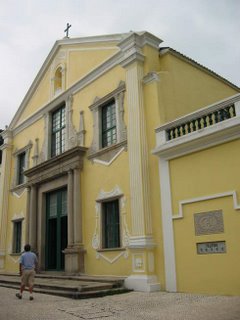
The Portugese first set foot on Chinese soil in 1513
in Macau and by 1556 they reached an agreement with
the Guangzho officials which allowed the Portugese to
rent this peninsula of land in return for ridding the
area of marauding pirates who had plagued this stretch
of coast for years. Macau grew rapidly as a trading
center mostly because the Chinese were anxious to
trade but were forebidden to go abroad under penalty
of death. The Portugese traded silks, cotton and
textiles, porcelein, spices, aromatic woods, Japanese
silver, swords, lacquerware and fans in the region
between west India and Japan and acted as agents for
Chinese merchants.
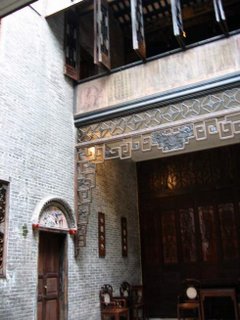
For almost 3 centuries, Macau's strategic location
at the mouth of the Pearl River, meant it served as a
hub in a complex network of maritime trade.
Missionaries from different European religious orders
entered China through Macau, making
Macau a center for Christianity in the east.

The colony of Macau became an outpost for all Europe in
China, a post it held until the British took posession
of Hong Kong in 1841 and other Chinese ports were
forced to open to foreign trade. A series of
disastrous skirmishes were settled through negotiation
and it was not until 1887 that China recognized
Portugese sovereignty over Macau. The colony turned
into something of a decaying backwater once the
Chinese decided they had no use for Macau and opened
other ports to foreign trade. Yet the decline of Macau
was stemmed by the introduction of licensed gambling,
which is still its most important source of revenue.
Once the Joint Declaration over Hong Kong was signed
between the Chinese and British governments, it was
inevitable that China would also seek a similar
agreement with Portugal over the fate of Macau. Like
Hong Kong, Macau is a Special Administrative Region
(SAR) of China for 50 years following the handover of
the territory, during which it supposed to enjoy a
high degree of autonomy in all matters except defence
and foreign affairs. So far so good, though not
without a few hiccups.
While Macau is strongly influenced by its local
Chinese population, one immediately feels the precense
of its Portugese colonialism. The architecture is a
charming old style European.

The streets are tiled, and gorgeous yellow cathedrals loom above
the rooftops. Unlike in Hong Kong, much of the history
and many colonial buildings have been preserved since
it became a world heritage site in 2005. Signs are
written in Chinese and Portugese, though many now also
feature English. The landscape of Macau is dotted
with numerous picturesque cathedrals, sections of the
old city walls and a mount fortress. Macau's most famous
landmark is the ruins of Saint Paul, an
impressive baroque facade of a cathedral that was
finished in 1602 and destroyed by fire during a
disastrous typhoon in 1835. At that site was the
first western style university in the far east.
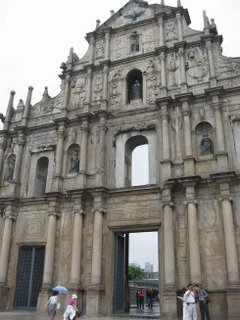
The Largo de Senado, the senate square, is a tiled open
space with a fountain, surrounded by pastel-colored
neo-classical buildings creating a delightful
Mediterranean atmosphere. We enjoyed some fresh
grilled sweets we bought from a street vendor.
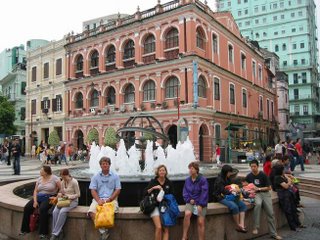
Dr. Sun Yat Sen practiced medicine in Macau for some years
before seeking to overthrow the Qing dynasty in 1911
and a memorial house to him replaces the original
house which blew up when used as an explosives store.
We saw the home of a residential compound of a weathly
Chinese, featuring courtyards and details that
revealed the mix of cultures and materials available
in this international trading center. We also saw
moorish barracks, built in 1874 for an Indian regiment
that served as part of Macau's police force.
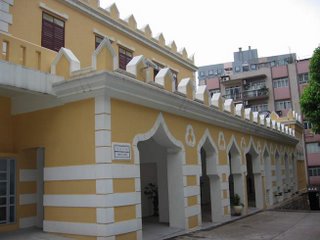
A temple dedicated to the goddess of the sea, known as Tin Hau
in Hong Kong but as Amah in Macau, still stands from a
time before the city of Macau came into existence. In
fact Macau gets its name from this goddess - A-Ma-Gau,
the bay of A-Ma.
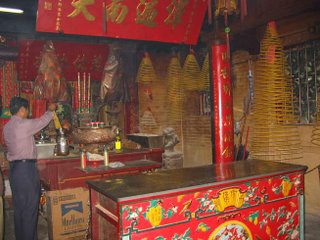
And one of our favorite sites was
the dog WCs that were sprinkled around the city; Yes,
you really read "dog WC": that's a designated potty
spot for dogs, complete with graphic sign making its
purpose more clear.
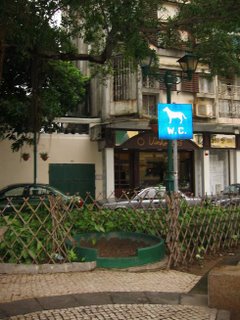
One of the most rewarding aspects of a visit to Macau
is the exotic mixture of food that is derived from the
mixing of so many cultures and heavily influenced by
the vast trading territory of the Portugese. African
Chicken is one of the most popular tasty entrees on
offer and my personal favorite. We also sampled spicy
prawns, roasted mackerel, a variety of delicious
sausages, and Bacalhau, a salted cod served in a
variety of ways. And of course, lots of Vinho Verde!
In search of fine restaurants that could handle a
table for 9 without reservations, we travelled to the
other islands in Macau: Coloane and Taipa and
appreciated the opportunity to see a greater part of
the Macau territory. A sweetened jerky was for sale
everywhere, yet we weren't that enamored with it.
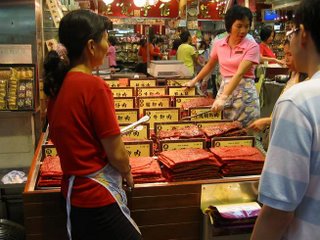
Macau is known as a great gambling destination. A
number of architects we know in Hong Kong have been
busy with the casino building boom currently underway
in Macau. We have heard that Macau has surpassed Las
Vegas in gambling receipts. We saw the Sands, Wynn
and other dramatic architecture or themed park style
buildings, providing a marked contrast to the colonial
architecture elsewhere. A father is soon to be in
competition with his daughter and his son, each with
their own casino under construction. We couldn't
resist a stroll through the casino following the
fireworks display at the end of one evening. An
airless, timeless feel was notable as we watched the
serious gamblers and slot machine junkies pursue the
big win. Friends who once won during a visit to Macau
told us how unappreciated their celebrations were as
they collected their winnings in the company of others
who had lost. None of us were tempted to gamble that
night, however. There was too much other interesting
stuff to do.
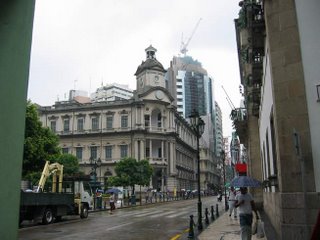
We fit quite a bit into our short visit, but it was
soon time to check out with Immigration and race the
60 miles back to Hong Kong and then make our way back
to Hebe Haven. The wind died, making the racing less
than stellar and we were forced to motor a chunk of
the way back so we wouldn't be out all night on a work
night.

<< Home